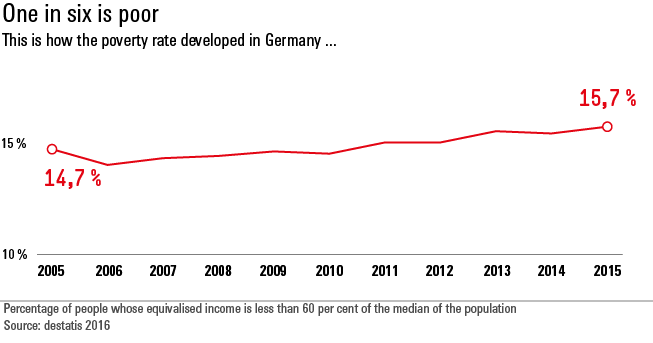: 7. How widespread is poverty in Germany?
Since the early 1990s the proportion of poor people in the total population has risen, particularly sharply in the first half of the 2000s. According to data from the German Federal Statistical Office, the poverty rate rose to 15.7 per cent in 2016 – making it the highest since reunification. That means one in six living in relative poverty. By the standard definition used in science, a person is deemed poor if he/she is living in a household whose disposable income is less than 60 per cent of the median need weighted net household income.
The most recent rise in the poverty rate is also related with immigration: many people who come to Germany initially have a very low income. That is now reflected in the statistics (Seils 2016). On the other hand, if one looks at only the population without a migration background, the poverty rate has not risen in the last two years. However, in view of the good economic situation one would expect poverty to decrease. That has not happened – although there are fewer unemployed (Spannagel 2015).
Another thing is that once someone is poor it is increasingly difficult to escape from poverty. Between 1991 and 1995 about 47 per cent of the poor managed to climb up to the middle tier. Only 36 per cent managed to do so from 2009 to 2013 (Spannagel 2016). And for people directly above the poverty line their chances of rising have fallen, whilst their risk of sliding into poverty has gone up. Those slipping below the line are often low-qualified, in mini-jobs or unemployed. The elderly are increasingly hit by poverty as well. In addition to relative income poverty there are more dimensions of poverty, which relate for instance to whether a person has sufficient means to be able to participate in “normal” social life. To be excluded from society can be just as tough for those affected as material deprivations.
References
Butterwegge, Christoph: Der Streit um den Armutsbegriff: Polemiken, Probleme, Perspektiven, in: Soziale Sicherheit 11/2015
Seils, Eric: Wie wirkt sich Einwanderung auf die Armut aus?, WSI-Verteilungsmonitor, September 2016
Spannagel, Dorothee: Soziale Mobilität nimmt weiter ab, WSI-Verteilungsbericht 2016, September 2016
Spannagel, Dorothee: Trotz Aufschwung: Einkommensungleichheit geht nicht zurück, WSI-Verteilungsbericht 2015, November 2015
